All are welcome to attend this lunch lecture. Food will be provided to those who RSVP within 48 hours of the event.
Physician burnout and physician suicide are epidemic. In this lecture we will look at various contributing factors and what can be done.
 Dr. Beth Haynes, medical director of the Benjamin Rush Institute, will be meeting with students of the Stony Brook Medical School campus during lunch to discuss the topic of physician burnout and how it affects the patient-doctor relationship.
Dr. Beth Haynes, medical director of the Benjamin Rush Institute, will be meeting with students of the Stony Brook Medical School campus during lunch to discuss the topic of physician burnout and how it affects the patient-doctor relationship.
POST-EVENT SUMMARY: Dr. Haynes provided a very nice overview of physician burnout, recent trends in physician burnout epidemiology, and some of the root causes of burnout. The continued intrusion of government, insurance companies, EMRs and other third parties have eroded the physician-patient relationship. Not only does this negatively impact our patients, but it also exacts a toll on physicians.
Beth then transitioned to summarizing some of the research into the neurobiology of human relationships, and how these insights help us understand burnout. To activate neurohormonal axes in the brain, humans need meaningful social contact, including eye contact, emotional connection, and physical contact. These basic elements that underly the neurobiology of the physician-patient relationship are lacking in today's overburdened and regulated practice settings.
Notably, direct primary care doctors claim that their practices are more fulfilling and inspire them because these physicians can practice medicine the way it should be, and form meaningful bonds with their patients.

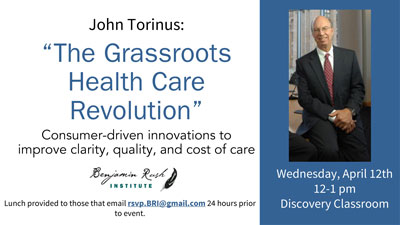
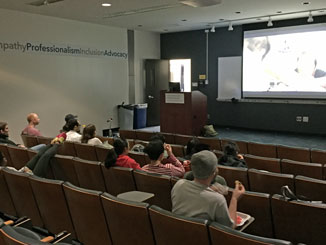 Students at George Washington University watch Code Black.
Students at George Washington University watch Code Black.
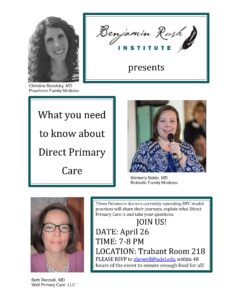
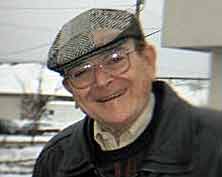 Dr. Harold Chevlen, MD, a 95-year old retired physician who practiced independent family medicine for 50 years in Youngstown, Ohio, will be discussing the changes that occurred throughout his career. In particular he'll describe how things most medical students take for granted, such as antibiotics revolutionized his practice of medicine. He will also talk about the joys of family medicine.
Dr. Harold Chevlen, MD, a 95-year old retired physician who practiced independent family medicine for 50 years in Youngstown, Ohio, will be discussing the changes that occurred throughout his career. In particular he'll describe how things most medical students take for granted, such as antibiotics revolutionized his practice of medicine. He will also talk about the joys of family medicine.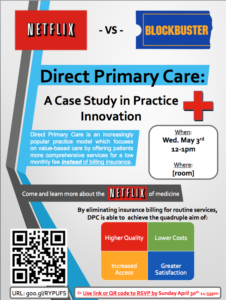 All are invited to attend a lunch lecture by
All are invited to attend a lunch lecture by  Dr. Beth Haynes, executive director of the Benjamin Rush Institute, will be meeting with students of the Stony Brook Medical School campus during lunch to discuss the topic: "What Is and Isn't Insurance, and Why It Matters to Controlling Healthcare Costs."
Dr. Beth Haynes, executive director of the Benjamin Rush Institute, will be meeting with students of the Stony Brook Medical School campus during lunch to discuss the topic: "What Is and Isn't Insurance, and Why It Matters to Controlling Healthcare Costs." Dr. Beth Haynes, medical director of the Benjamin Rush Institute, will be meeting with students of the Stony Brook Medical School campus during lunch to discuss the topic of physician burnout and how it affects the patient-doctor relationship.
Dr. Beth Haynes, medical director of the Benjamin Rush Institute, will be meeting with students of the Stony Brook Medical School campus during lunch to discuss the topic of physician burnout and how it affects the patient-doctor relationship.